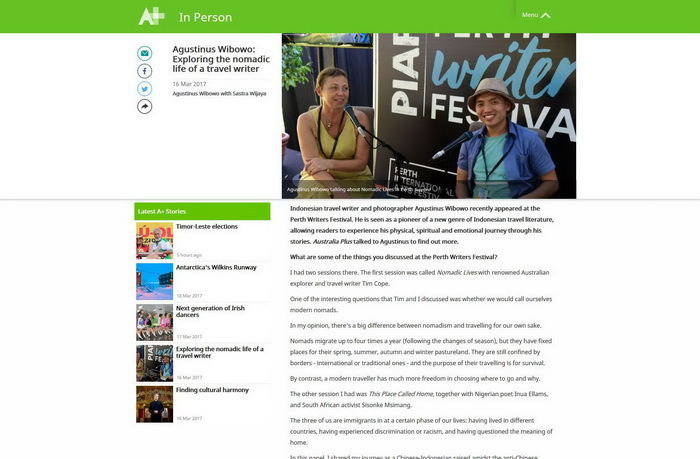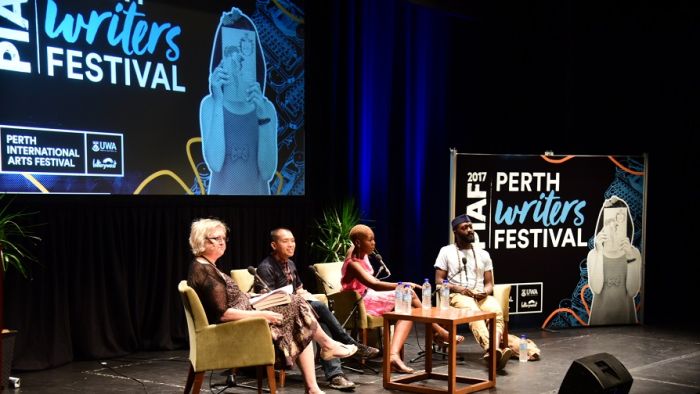Indonesian travel writer and photographer Agustinus Wibowo recently appeared at the Perth Writers Festival. He is seen as a pioneer of a new genre of Indonesian travel literature, allowing readers to experience his physical, spiritual and emotional journey through his stories. Australia Plus talked to Agustinus to find out more.
What are some of the things you discussed at the Perth Writers Festival?
I had two sessions there. The first session was called Nomadic Lives with renowned Australian explorer and travel writer Tim Cope.
One of the interesting questions that Tim and I discussed was whether we would call ourselves modern nomads.
In my opinion, there’s a big difference between nomadism and travelling for our own sake.
Nomads migrate up to four times a year (following the changes of season), but they have fixed places for their spring, summer, autumn and winter pastureland. They are still confined by borders – international or traditional ones – and the purpose of their travelling is for survival.
By contrast, a modern traveller has much more freedom in choosing where to go and why.
The other session I had was This Place Called Home, together with Nigerian poet Inua Ellams, and South African activist Sisonke Msimang.
The three of us are immigrants in at a certain phase of our lives: having lived in different countries, having experienced discrimination or racism, and having questioned the meaning of home.
In this panel, I shared my journey as a Chinese-Indonesian raised amidst the anti-Chinese atmosphere of Indonesian President Suharto’s New Order regime.
The discrimination made me wonder whether China, the land of my ancestors, was the real home for me.
I went to China, lived there for several years and learned to understand my ‘Chinese-ness’, only to find out I didn’t really belong to the country as I had previously expected.
In 2005 I began travelling the overland routes for four years, starting from Beijing with the dream of reaching South Africa. I called this my ‘Grand Overland Voyage’, with the dream of searching for my real home.
I didn’t reach South Africa though, as I ended up staying in Afghanistan for almost three years.
After ten years wandering the world, I had to come back to my home in Indonesia where my mother was suffering from cancer and waiting for the last days of her life.
I realised that home is more a place. Home is a state of mind where you have already reconciled with your past and future; once this state is reached everywhere can be your home.
Was this your first visit to Australia? How does Australia compare to places that you visited in Central Asia?
This is my third time visiting Australia. All my visits to Australia have been to participate in various writers festivals.
So my visits to Australia are more about my profession as a writer, which is totally different from my experiences of travelling in Central Asia, where I have more chance to explore and observe the reality of life.
Nevertheless, I was amazed by the hospitality and the easygoingness of Australians. Strangers talk to strangers on the streets, praising the weather or the appearance of others.
Similarly I’m amazed by the hospitality and the easygoingness of Central Asians, where it’s very common that strangers invited me to have a tea or stay overnight in their houses.
The big difference, based on my limited observation, is that Australia is a country of law and order, where you can see regulations and reminders are posted everywhere on the streets, and people are used to follow the rules to the smallest details.
On the contrary, in Central Asia almost everything is negotiable, and you can always find a way out even under the most improbable regulations, thus you will have more opportunities for adventures and unexpected experiences.
Tell us about your third book Titik Nol (Zero: When the Journey Takes You Home), and your mother’s story.
My third book has been called a pioneer of a new genre in Indonesian travel literature, as it allows readers to experience my physical, spiritual and emotional journey as they contemplate their own conflicts and anxieties. It is also being adapted into a movie in Indonesia.
After ten years travelling, I had to come home to face the reality that my mother was on the brink of death.
So I sat next to her and read her my travel notes from faraway lands and from places that mostly she’d never heard of.
My mother has almost never travelled anywhere, so I wanted her to travel the world through my stories.
But at the same time, my mother also started to open up herself, to share the stories of her own journey – her life journey as a Chinese-Indonesian woman; her childhood, her struggle, her love and jealousy and waiting, her understanding of living and dying.
This made me realise the other layer of journey, to understand that despite us having different journeys in our life, we in fact all share the same journey.
This book is a tribute to my late mother, but I also think that the life lessons that I learned from the road may help some of my readers who face various obstacles in their life journey.
What are you currently working on?
My fourth book project will be focusing on Indonesia. For me, the fact that Indonesia still stands as a nation is a big mystery.
The country is so spread out, with 300 ethnic groups and more than 700 languages, separated by islands and seas, but still managed to keep intact as one country despite the bloodshed that has marred its history.
I wanted to understand what makes Indonesia as Indonesia. Therefore, I started to travel along Indonesian borders with Papua New Guinea, where I learned about the West Papuan freedom movement.
I also went to Aceh to learn about the life after the conflict and tsunami. I went to Holland and Suriname to see Indonesia from the perspective of the Indonesian diaspora.
I am planning to travel to East Timor later this year, to know what independence mean for them who have already acquired it.
This book will be about Indonesian nationalism, to see what is the myth and what is the reality that glued or separated the archipelago.








Keren banget nih penulis produktif kita. Karyanya menggugah dan membuat kita merenung.
kpn buku ke-4 launching?.. *g sabar
Bung, coba jelaskan maksud perjalananku bukan perjalananmu. Perjalannku adalah perjalananmu disampul buku Titik Nol.
Nunggu buku ke-empatnya mas! Kalau udah keluar, bakal dibeli dan dibaca 🙂
Mungkin yang dimaksud oleh mas agus dalam quote tersebut adalah penceritaan perjalanannya kepada ibunda beliau, walaupun perjalanan mas agus bukanlah perjalanan ibunya, tapi dalam cerita mas agus kepada ibunya seolah-olah yang ibunya rasakan adalah melakukan perjalanan tersebut bersama mas agus, begitupun sebaliknya.
Sangat bermanfaat sekali mantap kak.